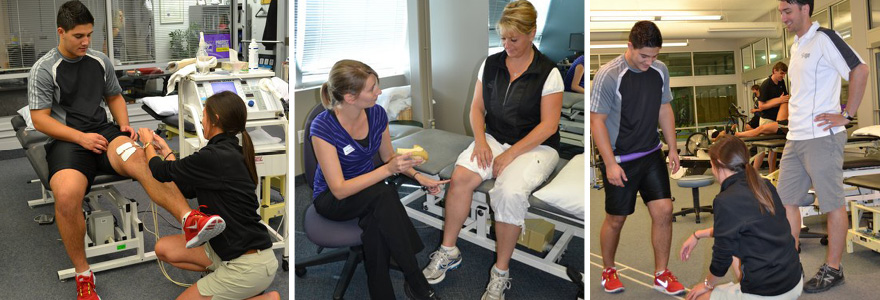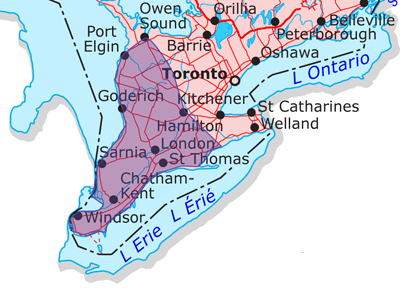Programs
Clinical Education
Contact
Erin Williams
Clinical Placements Coordinator, Rehabilitation Sector Schools
519-661-2111 ext. 88754
ptclined@uwo.ca
Clinical Placements

The main goal of the Western MPT Program is to graduate master adaptive and highly competent clinicians ready to assume duties in any of the general areas of physical therapy practice in Canada.
Clinical placements, in which students receive instruction and supervision from practicing physical therapists in a variety of clinical environments, are an important part of the learning experience for students in the MPT program. These placements provide opportunities for students to put into practice the theory and clinical skills learned in classrooms and laboratories.
The clinical experience aspect of the Western MPT program includes four clinical experiences, each 7-8 weeks in length, for a total of 30 weeks of practical clinical education within health care facilities across southwestern Ontario, other provinces or with international clinical partners.
Meet our students
Learn about their clinical placements in their own words.
Placement Details
Western MPT students complete four clinical placements over the course of the two-year program.
| Placement | Course # | Level of Student | Year of Program | Time Period | Length (wks) |
|---|---|---|---|---|---|
| 1 | PT 9181 | Junior | 1 | June – August | 8 |
| 2 | PT 9182 | Intermediate | 2 | November – December | 7 |
| 3 | PT9183 | Senior | 2 | February – April | 7 |
| 4 | PT 9184 | Consolidation | 2 | April – June | 8 |
Students are expected to graduate with a mix of clinical placement experiences assessing and treating a diverse population of individuals and conditions across settings, areas of practice and lifespan to ensure they meet graduation requirements and are prepared for clinical practice.
Settings
Students practice in the following clinical placement settings:
- Acute care/hospital
- Rehabilitation/complex continuing care/long-term care/pediatrics
- Ambulatory care clinics (out-patient clinics)
- Community/home care (when available; not required for graduation)
Area of Practice
Students gain experience in the following areas of practice:
- Cardiovascular and respiratory (CR)
- Neurological (Neuro)
- Musculoskeletal (MSK)
- Multisystem conditions
Lifespan
Students work with individuals across the lifespan:
- Children (< 17 years)
- Adults (18 – 64 years)
- Seniors (> 65 years)
Placement Sites
 The MPT program collaborates with more than 125 clinical facilities in southwestern Ontario to offer placement experiences to MPT students. Placements are arranged within the Western catchment area (highlighted in purple), which extends from Windsor in the southwest to Owen Sound in the north, and to Kitchener/Cambridge in the east.
The MPT program collaborates with more than 125 clinical facilities in southwestern Ontario to offer placement experiences to MPT students. Placements are arranged within the Western catchment area (highlighted in purple), which extends from Windsor in the southwest to Owen Sound in the north, and to Kitchener/Cambridge in the east.
Students are required to complete placements, as arranged and assigned by the Academic Coordinator of Clinical Education (ACCE), at any of the affiliated health care facilities within southwestern Ontario. Given Western’s catchment area, all students will be required to relocate for at least two (or more) placements. Examples include students relocating to Windsor, Sarnia, Chatham or Owen Sound for the 7-8 week periods. Southwestern Ontario consists of a mix of rural communities, small towns and larger cities. Students must be prepared to relocate to any of these communities to complete their clinical placements and meet graduation requirements.
Placements Outside of Western’s Catchment Area
Within Canada
Western MPT students may have the opportunity to complete placements in another part of Canada, within the catchment area of another university. These opportunities are not guaranteed and depend on placement availability within that school’s catchment area. With increased enrolment in PT programs in schools across Canada and capacity changes secondary to COVID-19, out-of-catchment placements are increasingly difficult to acquire. Students are not permitted to complete more than one placement in an out-of-catchment area. For example, two placements cannot be completed in McMaster’s catchment area. All clinical placements are arranged by the ACCE. Students are not permitted to contact sites to arrange placements.
International
Western MPT students can complete a placement at an international site. These opportunities are not guaranteed and vary year to year. In the past MPT students have completed international placements in Australia, United States, United Arab Emirates, Hong Kong, South Africa, India and England. International placements are normally arranged for the third or fourth clinical placements.
Associated Costs and Funding
Students are responsible for all costs incurred related to the completion of the required clinical placements. Completing placements outside of London might be associated with additional costs (such as temporary housing rental, travel to/from London, parking, etc). Access to a vehicle during clinical placements is beneficial, but not necessary.
Additional funding may be available through funds provided by the Ministry of Colleges and Universities (MCU), and is subject to change.
Funding is also available through various bursaries and awards from Western's School of Physical Therapy, School of Graduate and Postdoctoral Studies and Society of Graduate Students.
Placement Requirements
Medical Requirements
During clinical placements, students in the MPT program may be required to care for persons with infectious diseases (including but not limited to Hepatitis, TB, HIV, AIDS). Therefore, students must meet the Ontario Ministry of Labour, Bill 18, Stronger Workplaces for a Stronger Economy Act (2014) policies and guidelines for the protection of workers in addition to requirements specified by each affiliated healthcare facility. All requirements are for the students’ and patients’ protection and must be completed prior to each program year.
Students must also be aware that at this time most placement partners including hospitals, long-term care facilities, and community clinics, have pre-placement policies for students that include mandatory vaccination requirements. Students will be required to be compliant with the policy requirements of our placement partners in order to attend placements in those facilities. If students are not compliant with those policies, they will not be able to attend those placements and will fail to meet clinical graduation requirements. Students that fail to meet clinical graduation requirements will not be eligible to complete the program.
Valid CPR: Students must have a valid Basic Life Support (Level C) CPR certificate. This certification must remain up-to-date. Western Campus Recreation offers Standard First aid with CPR-C full courses and recertification courses. Students may choose to take this course or take one independently. The provider must use the Heart and Stroke Foundation Guidelines in order to be acceptable.
Criminal Records Check and Vulnerable Sector Screening (VSS): Prospective students should be aware that a criminal records check or VSS may be required by many sites before they will allow students to begin their placement. They can be obtained through the London Police Services, the RCMP, or a local law enforcement agency. No third-party reviewers will be accepted. All fees associated with this requirement are the student’s responsibility. Students from out of province need to complete the security check in their home province.
Immunization Requirement: To meet patient protection standards, students are required to obtain specified immunizations prior to starting the program. Some examples of the immunizations required include tetanus/diphtheria, pertussis, polio, MMR (measles, mumps, rubella), varicella, influenza, Hep B, tuberculosis, and COVID-19. These must all be valid and up to date for the duration of the two-year program. A checklist and further details will be provided to the students on admission to the program.
Fit-testing for the N95 respirator mask: To protect against infectious respiratory diseases, students must be fit-tested for an N95 mask. There are several testing facilities in London if students are looking for a place to complete this requirement in London.
Graduation Requirements
To meet graduation requirements, students must complete a minimum of 1025 clinical hours and achieve entry-level in the following PT essential competencies:
- Expert (assessment, analysis, diagnosis, prognosis, intervention, discharge planning)
- Communicator
- Collaborator
- Manager
- Advocate
- Scholarly Practitioner
- Professional
Clinical Placement Accommodations
Accommodation consists of arrangements that allow a student with a disability a fair opportunity to engage in academic activities and fulfill essential course and program requirements. Accessible Education (AE) at Western provides support and services to students with disabilities at Western, including academic and fieldwork accommodations.
Because of the individualized nature of accommodation, students and prospective students are encouraged to meet with an Accessible Education counselor early on to obtain information about specific accommodations and services that may be available to them.
Some academic accommodations, such as those for traditional lecture-based courses, may not be suitable or appropriate when students are completing clinical placements. In such instances, accommodations that are specific and can be operationalized to learning in clinical placement contexts will need to be considered.
Students are also responsible for ensuring academic accommodations are updated each term and are in place early for clinical placements.
Please see the Academic Accommodation page for more information.
Clinical Placements Office
Our Clinical Placements Team assists in the planning, administration, and coordination of clinical placements. For detailed information with respect to pre-placement requirements, dates and deadlines, and frequently asked questions, please visit our web pages.




